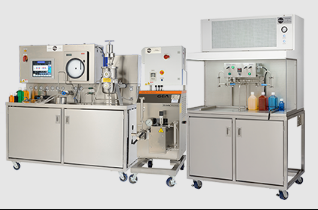Small pasteurizers are essential tools for small-scale food and beverage producers. These compact machines are designed to heat-treat products, ensuring their safety and extending shelf life. In this article, we will delve into the world of small pasteurizers, focusing on their benefits, operation, and the role they play in small batch pasteurisation.
Small pasteurizers, also known as small batch pasteurizers, are compact devices used in the food and beverage industry to heat-treat liquids or semi-liquids. The primary purpose of pasteurisation is to eliminate harmful pathogens and enzymes while preserving the product’s quality. Unlike industrial-sized pasteurizers used by larger manufacturers, small pasteurizers are designed to cater to the needs of small-scale producers.
These machines typically have a lower processing capacity compared to their larger counterparts, making them perfect for artisanal and boutique businesses. Small pasteurizers are used to process various products, including milk, fruit juices, soups, sauces, and more.
Benefits of Small Batch Pasteurization
Small batch pasteurisation offers several advantages for businesses that focus on quality and small-scale production. Here are some key benefits:
- Preservation of Product Quality: Small pasteurizers use gentle heat treatment, which helps retain the natural flavour, colour, and texture of the product. This is crucial for artisanal producers who take pride in delivering high-quality goods.
- Pathogen Elimination: Pasteurization effectively eliminates harmful bacteria and pathogens, ensuring that the final product is safe for consumption. This is particularly important for dairy products and fruit juices.
- Extended Shelf Life: By destroying spoilage microorganisms, small batch pasteurisation extends the shelf life of perishable products. This helps reduce food waste and allows producers to reach a broader customer base.
- Regulatory Compliance: Many countries have strict regulations regarding the sale of food and beverages. Small pasteurizers help businesses meet these regulatory requirements by ensuring the safety of their products.
- Versatility: Small pasteurizers are versatile and can be used for a wide range of products. Whether you’re producing creamy yogurt or zesty tomato sauce, these machines can accommodate various recipes.
How to Operate a Small Pasteurizer
Operating a small pasteurizer may seem daunting at first, but with proper guidance, it can be a straightforward process. Here’s a step-by-step guide:
- Preparation: Start by cleaning and sanitising the small pasteurizer and all the equipment you’ll be using. This is crucial to prevent contamination.
- Filling: Carefully pour your product into the pasteurizer. Be sure not to overfill, as there should be enough space for the product to expand as it heats up.
- Heating: Turn on the pasteurizer and set the temperature according to the requirements of your product. Different products may require varying temperatures, so consult your recipe or regulatory guidelines.
- Pasteurisation: Allow the pasteurizer to heat your product to the desired temperature, ensuring that it remains at that temperature for the required duration. This step effectively kills harmful microorganisms.
- Cooling: After pasteurisation, the product needs to be rapidly cooled to prevent overcooking and maintain quality. Use the pasteurizer’s cooling system or transfer the product to a cooling tank if necessary.
- Packaging: Once your product is cooled, it can be packaged for distribution or storage. Ensure that your packaging materials are clean and suitable for your product type.
- Cleaning and Maintenance: After use, clean and sanitise the pasteurizer thoroughly to prevent any residue buildup. Regular maintenance will prolong the machine’s lifespan and ensure it operates efficiently.
The Bottom Line
Small pasteurizers, or small batch pasteurizers, play a vital role in the food and beverage industry, especially for small-scale producers. These machines offer numerous benefits, including quality preservation, pathogen elimination, extended shelf life, and regulatory compliance. Learning how to operate a small pasteurizer is essential for any business aiming to deliver safe and high-quality products to its customers. With proper use and maintenance, small pasteurizers can contribute to the success and growth of small-scale food and beverage enterprises.


















